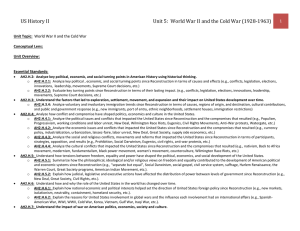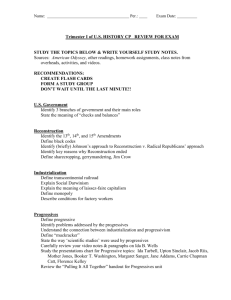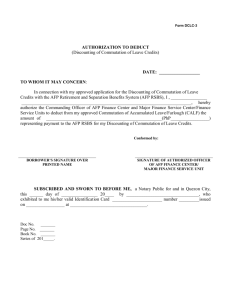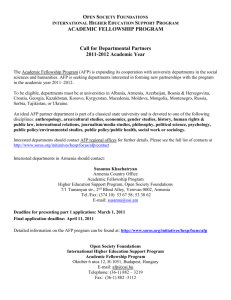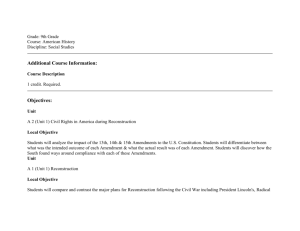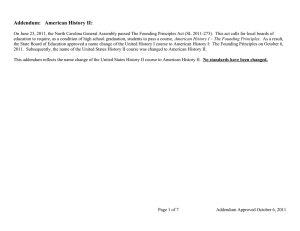Unit 3 - Imperialism and World War I
advertisement
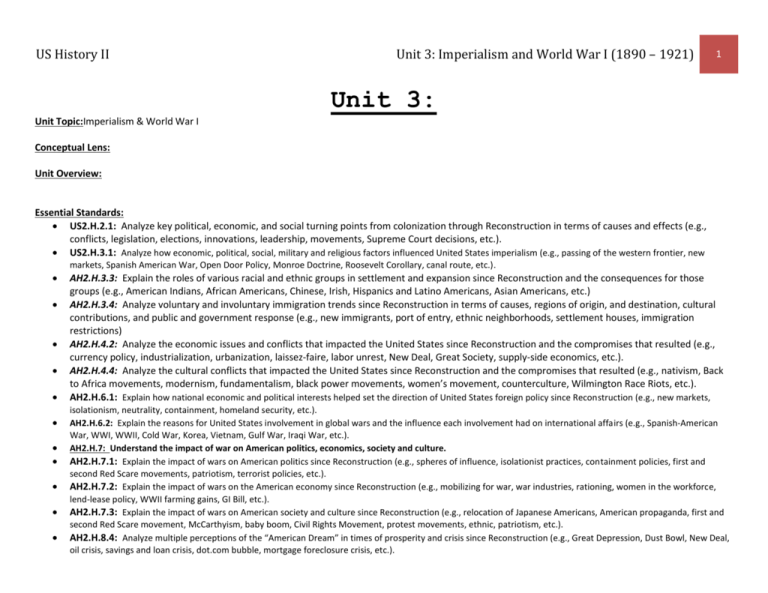
US History II Unit 3: Imperialism and World War I (1890 – 1921) 1 Unit 3: Unit Topic:Imperialism & World War I Conceptual Lens: Unit Overview: Essential Standards: US2.H.2.1: Analyze key political, economic, and social turning points from colonization through Reconstruction in terms of causes and effects (e.g., conflicts, legislation, elections, innovations, leadership, movements, Supreme Court decisions, etc.). US2.H.3.1: Analyze how economic, political, social, military and religious factors influenced United States imperialism (e.g., passing of the western frontier, new markets, Spanish American War, Open Door Policy, Monroe Doctrine, Roosevelt Corollary, canal route, etc.). AH2.H.3.3: Explain the roles of various racial and ethnic groups in settlement and expansion since Reconstruction and the consequences for those groups (e.g., American Indians, African Americans, Chinese, Irish, Hispanics and Latino Americans, Asian Americans, etc.) AH2.H.3.4: Analyze voluntary and involuntary immigration trends since Reconstruction in terms of causes, regions of origin, and destination, cultural contributions, and public and government response (e.g., new immigrants, port of entry, ethnic neighborhoods, settlement houses, immigration restrictions) AH2.H.4.2: Analyze the economic issues and conflicts that impacted the United States since Reconstruction and the compromises that resulted (e.g., currency policy, industrialization, urbanization, laissez-faire, labor unrest, New Deal, Great Society, supply-side economics, etc.). AH2.H.4.4: Analyze the cultural conflicts that impacted the United States since Reconstruction and the compromises that resulted (e.g., nativism, Back to Africa movements, modernism, fundamentalism, black power movements, women’s movement, counterculture, Wilmington Race Riots, etc.). AH2.H.6.1: Explain how national economic and political interests helped set the direction of United States foreign policy since Reconstruction (e.g., new markets, isolationism, neutrality, containment, homeland security, etc.). AH2.H.6.2: Explain the reasons for United States involvement in global wars and the influence each involvement had on international affairs (e.g., Spanish-American War, WWI, WWII, Cold War, Korea, Vietnam, Gulf War, Iraqi War, etc.). AH2.H.7: Understand the impact of war on American politics, economics, society and culture. AH2.H.7.1: Explain the impact of wars on American politics since Reconstruction (e.g., spheres of influence, isolationist practices, containment policies, first and second Red Scare movements, patriotism, terrorist policies, etc.). AH2.H.7.2: Explain the impact of wars on the American economy since Reconstruction (e.g., mobilizing for war, war industries, rationing, women in the workforce, lend-lease policy, WWII farming gains, GI Bill, etc.). AH2.H.7.3: Explain the impact of wars on American society and culture since Reconstruction (e.g., relocation of Japanese Americans, American propaganda, first and second Red Scare movement, McCarthyism, baby boom, Civil Rights Movement, protest movements, ethnic, patriotism, etc.). AH2.H.8.4: Analyze multiple perceptions of the “American Dream” in times of prosperity and crisis since Reconstruction (e.g., Great Depression, Dust Bowl, New Deal, oil crisis, savings and loan crisis, dot.com bubble, mortgage foreclosure crisis, etc.). US History II Unit 3: Imperialism and World War I (1890 – 1921) 2 Conceptual Webbing: Exploration, Settlement, Movement, and Expansion Big Ideas: The need for new markets caused by the 2nd Industrial Revolution How war and disease impact migration Essential Vocab: Sanford Dole; The Great Migration; The Spanish Flu; Conflict and Compromise Big Ideas: Political and diplomatic turning points Essential Vocab: Anglo-Saxon Superiority; White Man’s Burden; Senator Henry Cabot Lodge; Yellow Press; William R. Hearst; Joseph Pulitzer; Women in the workforce; Freedom, Equality, International and Power Affairs and Foreign Policy Big Ideas: Political and diplomatic turning points Essential Vocab: Militarism; Alfred T. Mahan; Rudyard Kipling’s White Man’s Burden; Espionage and Sedition Acts; Schenck v USA, Clear and Present Danger; Committee of Public Information; Food Administration; Liberty Bonds; Government Controls; George Creel; War Big Ideas: Diplomatic Turning Points Big Ideas: Militaristic Turning Points Essential Vocab: Imperialism; Sphere of Influence; Alfred T. Mahan’s Influence of Sea Power History; Modern Navy; Protectorate; Commonwealth; Annexation; Teller Amendment; Platt Amendment; Treaty of Paris, 1898; Open Door Policy; Roosevelt Corollary; Big Stick Politics; Portsmouth Conference; Dollar Diplomacy; Missionary Diplomacy; Hawaii; DeLome Letter; McKinley Tariff; White Man’s Burden; Boxer Essential Vocab: Spanish-American War; Rough Riders; George Dewey; USS Maine; Filipino-American War; World War I; Militarism; Convoy System; Trench Warfare; No Man’s Land; Unrestricted Submarine Warfare; John Pershing; Mechanized Warfare; Progress, Crises, and the American Dream Big Ideas: Critical Content: Josiah Strong; Women’s Role during War; Victory Gardens; US History II Unit 3: Imperialism and World War I (1890 – 1921) 3 Rebellion; Nationalism; Alliances; Imperialism; Archduke Franz Ferdinand; Zimmerman Note; Treaty of Versailles – 1919; 14 Points; League of Nations; 1921 AmericanGerman Peace Treaty; Reparations; War Guilt Clause; German Demilitarization; Essential Questions: Exploration, Settlement, Movement, and Expansion EQs: Conflict and Compromise EQs Freedom, Equality, International and Power Affairs and Foreign Policy EQs EQs How did the government’s role in economic and political affairs change as America became more imperialistic? How did technological advancement lead to the United States’ increased involvement in world affairs? To what extent was the government’s changing role necessary and beneficial as America became more imperialistic? How did America and the world change as the US increased its role in world affairs? To what extent have the effects of US actions and War EQs Progress, Crises, and the American Dream EQs US History II Unit 3: Imperialism and World War I (1890 – 1921) policies been beneficial or detrimental to other countries? Why did the United States take an active role in world affairs in the late 19th and early 20th century? To what extent have the actions and policies of the US affected other countries in the world? How has the media shaped US foreign policy? As the US becomes increasingly involved in world affairs, should its self-perception be impacted by world opinion. How intrusive should a nation be in the affairs of another? 1. McDougal-Littell Resources a. Textbook: The Americans i. Chapter 18: America Claims an Empire ii. Chapter 19: The First World War b. Internet: www.Classzone.com 2. Other Internet Resources 3. Literature 4 US History II 4. Audio/Visual Resources Unit 3: Imperialism and World War I (1890 – 1921) 5

